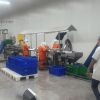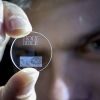-
 +1 +1
+1 +1Fully Automatic Cashew Kernels Pouch Packing Machine Manufacturer
Automatic And Manual Cashew Nut Pouch Packing Systems Fully processed cashew kernels are packed in bulk for export shipment in Nett Weight ...
-
 +23 +1
+23 +1Journalist’s phone hacked by new ‘invisible’ technique: All he had to do was visit one website. Any website.
Moroccan journalist Omar Radi investigates connections between politicians and business people, as well as social movements and human rights. In other...
-
 +29 +1
+29 +1eBay port scans visitors' computers for remote access programs
When visiting the eBay.com site, a script will run that performs a local port scan of your computer to detect remote support and remote management applications.
-
 +23 +1
+23 +1The 'Race To 5G' Is A Giant Pile Of Lobbyist Nonsense
We've noted for a while that the "race to 5G" is largely just the byproduct of telecom lobbyists hoping to spike lagging smartphone and network hardware sales. Yes, 5G is important in that it will provide faster, more resilient networks...
-
 +22 +1
+22 +1WhatsApp's Case Against Alleged Hackers Might Be an Uphill Battle
The Facebook-owned messaging company is taking on a notorious malware vendor in what could be an uphill battle.
-
 +27 +1
+27 +1Meet the E-Waste Recycler Jailed for a Year for Infringing Microsoft's Copyright
Eric Lundgren spent a year in prison for selling counterfeit Windows restore discs, now he’s home and ready to keep saving the planet.
-
 +35 +1
+35 +1Satellite crashes will plague us unless we manage space traffic better
Monday’s incident between SpaceX and ESA was just a taste of the problems we’ll see if we don’t overhaul how we handle the world’s satellites.
-
 +22 +1
+22 +1Scientists Develop Liquid Fuel That Can Store The Sun's Energy For Up to 18 Years
Our planet Earth has an abundance of fuels such as coal, petroleum, which sadly is diminishing at an alarming rate .
-
 +20 +1
+20 +1Upgrade? No Thanks. Americans Are Sticking With Their Old Phones
Americans are holding onto their smartphones for longer than ever.
-
 +21 +1
+21 +1Hyperloop One wants to help your self-driving car go the speed of sound
Imagine a future where you tap an app on your smartphone to summon a self-driving car. Heard this one already? Okay, what about when your robot car drives into an airless tube hundreds of miles long and careens across country at close to the speed of sound? Now are you impressed? This completely outrageous vision of the future comes courtesy of Hyperloop One, the occasionally troubled Los Angeles-based startup working on Elon Musk’s vision of an ultrafast transportation system.
-
 +26 +1
+26 +1The world's first hydrogen-powered passenger train is coming to Germany
This week, French transit company Alstom unveiled the world’s first hydrogen-powered passenger train, which will begin making trips in Germany at the end of the 2017. The news was first reported by German newspaper Die Welt. The super-quiet Coradia iLint passenger train is powered by hydrogen fuel cells, which emit only steam and condensed water. A hydrogen fuel tank stored on the roof of the train powers the fuel cells to produce electrical energy.
-
 +19 +1
+19 +1Your phone number is all a hacker needs to read texts, listen to calls and track you
Hackers have again demonstrated that no matter how many security precautions someone takes, all a hacker needs to track their location and snoop on their phone calls and texts is their phone number. The hack, first demonstrated by German security researcher Karsten Nohl in 2014 at a hacker convention in Hamburg, has been shown to still be active by Nohl over a year later for CBS’s 60 Minutes.
-
 +30 +1
+30 +1Can the Micro Bit inspire a million?
It was last May that the BBC unveiled an ambitious plan to give a million schoolchildren a tiny device designed to inspire them to get coding. Now, after a few bumps in the road, the Micro Bits are finally ending up in the hands of children. The tiny device can be plugged into a computer and programmed to do all sorts of cool stuff, and Year Seven pupils across the UK are being told it is theirs to take home. Some, who have had early access to the Micro Bit, have...
-
 +27 +1
+27 +1The nanolight revolution is coming
At Biopolis, a sprawling research complex in Singapore, Chi Ching Goh leans over an anaesthetized mouse lying on the table in front of her, and carefully injects it with a bright yellow solution. She then gently positions the mouse's ear underneath a microscope, and flips a switch to bathe the ear in ultraviolet light. Seen through the microscope's eyepiece, the illumination makes the blood underneath the skin glow green, tracing...
-
 +38 +1
+38 +1This Glass Disc Can Store 360 TB of Your Photos for 13.8 Billion Years
If you back up your photos on optical disks or storage drives, there’s a good chance your data won’t last as long as you do due to things known as “disc rot” and “data rot“. But what if you want to ensure that your precious photos live longer than you? Good news: a new “eternal” storage technology may be on the horizon. Scientists have created nanostructured glass discs that can storage digital data for billions of years.
-
 +44 +1
+44 +1Gene Roddenberry 'Star Trek' Secrets Decrypted From 200 Floppy Discs After 30 Years
DriveSavers engineers recovered data from 'Star Trek' creator Gene Roddenberry's custom made floppy discs after a year of hard work. The retrieved documents and original notes may be related to the 'Star Trek' series.
-
 +2 +1
+2 +1Evolution of Apple devices design
Apple Inc. is an American multinational corporation headquartered in Cupertino, California, that designs, develops, and sells consumer electronics, computer software, online services, and personal computers. Its best-known hardware products are the Mac line of computers, the iPod media player, the iPhone smartphone, and the iPad tablet computer.
-
 +22 +1
+22 +150 years ago today the word “hypertext” was introduced
On August 24, 1965 Ted Nelson used the word “hypertext” (which he coined) in a paper he presented at the Association for Computing Machinery. I was able to interview him earlier this month about the event and his early thoughts on the future of computing.
-
 +52 +1
+52 +1Stephen Hawking's speech tech released by Intel
Software that helps Prof Stephen Hawking to speak via a computer has been published online by Intel, the company that created it. The program interprets visual signals and translates them into words, which are then "spoken" by a machine. Intel originally developed the technology specially for Prof Hawking, but it has been used by other sufferers of motor neurone disease (MND).
-
 +19 +1
+19 +1An Oral History Of Facebook
One morning in 2004, students at Harvard University woke up and discovered a new website had launched that allowed them to connect with their classmates on a virtual social network. Within a few hours, the site had taken Harvard by storm, and within a few years, this campus fad would become a full-blown global phenomenon. It would make its founder the youngest billionaire in the world and would forever alter the fundamentals of human interaction. Facebook had been born.
Submit a link
Start a discussion




















